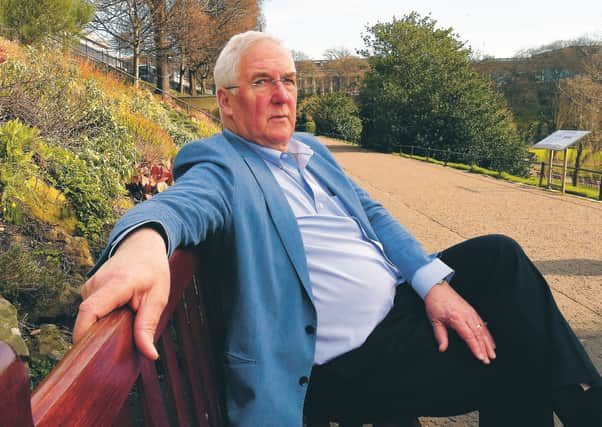Leading QC calls critics of Princes Street Gardens plan ‘scaremongers’


John Campbell, QC, who was counsel for the inquiry into the soaring cost of the Scottish Parliament building and who represented Donald Trump in his wind farm battle with the Scottish Government, has become the figurehead of the “Quaich Project”.
He attacked critics of the public-private partnership project for “scaremongering” over “completely untrue” claims that it would lead to over-commercialisation and privatisation of the gardens.
Advertisement
Hide AdAdvertisement
Hide AdHe said he was convinced the project had the backing of the people of Edinburgh, who realised that private finance would be needed to improve the “tired” and “lifeless” facilities in them due to a lack of council finance.
He admitted it was “intensely difficult” to raise money for the project, which is facing a £19 million shortfall, but insisted this was because it did not yet have planning permission.
Campbell will lead efforts to secure approval for the redevelopment and raise the funding for the project, which would see the gardens’ bandstand and concrete bowl replaced with a new stage, amphitheatre and two-storey visitor centre and corporate hospitality complex.
Campbell, who declared that the project would “reimagine one of the finest urban spaces in Western Europe,” has stepped in following the sudden resignation of the hotel developer Norman Springford as chair.
Campbell was previously a legal adviser to the developers behind the controversial bid to turn the former Royal High School on Calton Hill into a hotel, which the Scottish Government is still to make a final decision on.
However he cited his long-time involvement in heritage and conservation bodies, including the Cockburn Association and the Scottish Historic Buildings Trust.
Campbell said: “Some scaremongering has suggested private philanthropy is trying to turn the gardens into a commercial space. That’s not the purpose of the project.
“At the heart of it is a philosophy of trying to improve what is there already so it is better and more usable for the Edinburgh public.
Advertisement
Hide AdAdvertisement
Hide Ad“It isn’t about building a concert hall for tourists or attracting visitors in the summer. This is principally a project for the city’s residents, to improve their experiences in their gardens.
“The project is about making one of the finest urban spaces in Western Europe even better. What’s wrong with the gardens are the facilities within them.
“My sense of public opinion is that people feel the gardens have been neglected, but they also understand that the public purse is not deep enough to improve them without private assistance.
“When planning permission is in place it will be possible to approach donors, philanthropists, trusts and public authorities and invite them to be part of the project.
“Until then, raising money is intensely difficult.”
Campbell added: “The authorities used to permit events 200 times a year at the bandstand. Bands used to play four or five different times a day.
“We’re proceeding on the basis that the city will allow 15 event days a year and for the remaining 350 days it will be a much-improved open public space.
“Pop and rock concerts should be welcome. They’re not the Scottish Chamber Orchestra, they’re not genteel, but they’re part of modern culture. Are we so insufferably middle class that we can only put up with fireworks and classical music?
“I think the people of Edinburgh want to see these facilities improved so that their councillors can make sensible choices about what type of performances go on.”
Advertisement
Hide AdAdvertisement
Hide AdSpringford resigned as chair days after controversy erupted over leaked fundraising plans for the project, which suggested corporate backers will be able to link their brands to everything from new pathways and seating to the new amphitheatre.
Campbell insisted that there was “absolutely no evidence” to support claims that the gardens would be turned into a “private playground” reserved for wealthy donors and for commercial companies.